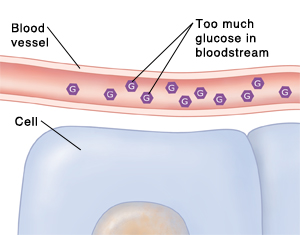Your blood sugar is high today. This is called hyperglycemia. It means there is too much sugar (glucose) in your blood.
Things that can cause high blood sugar include:
-
Certain medicines. These include glucocorticoids.
-
Stress.
-
An infection.
-
Eating just before your blood was drawn.
-
Certain health conditions. These include high blood pressure and abnormal cholesterol levels.
-
Higher weight or obesity.
-
Not enough physical activity, or spending a lot of time sitting.
-
Hormonal disorders. These include Cushing's syndrome and acromegaly.
A common cause is diabetes. Diabetes occurs when your body does not make enough insulin. This is a hormone that helps control blood sugar. Tests can help find the cause of high blood sugar. To bring your blood sugar down, you may get insulin.
When your body is working normally, the food you eat is turned into sugar. The sugar goes into your bloodstream. Insulin helps sugar move from the blood into the body’s cells. There, it is used as fuel. When you have diabetes, the sugar cannot enter the cells. It stays in the blood. This causes high blood sugar. And it causes the pancreas to make more insulin. Too much insulin over a long time lowers the response of the insulin receptors. These receptors move sugar into the cells. This makes the high blood sugar worse. And it can lead to type 2 diabetes and metabolic syndrome.
If not controlled, diabetes can cause long-term health problems. It can harm your blood vessels, heart, and nerves. This can happen even if you do not have symptoms. It can also harm your kidneys, the retina of your eyes, and other organs. Over time, high blood sugar can make a heart attack or stroke more likely. Metabolic problems caused by high blood sugar can lead to blindness and renal failure. They can also lead to peripheral neuropathy and loss of a limb, such as a toe or foot.
Follow-up care
Follow up with your health care provider as advised. To find out what is causing the high blood sugar, you will likely need more tests. You will be told more about these tests. If needed, your provider will refer you to a diabetes care team. They can help you learn about your high blood sugar and make changes to manage it. Talk with your provider about starting an exercise program. You may also want to meet with a dietitian. Look for a registered dietitian nutritionist (RDN) or a certified diabetes care and education specialist (CDCES). They will work with you to make a meal plan that includes your goals, as well as your likes and dislikes.
These actions can help control high blood sugar.
When to get medical advice
Contact your health care provider right away if any of these occur:
-
Excessive thirst or hunger
-
Frequent need to pee
-
Losing weight without trying or in spite of a normal appetite
-
Feeling tired
-
Nausea or vomiting
-
Itchy, dry skin
-
Belly pain
-
Fruity-smelling breath
-
Deep or rapid breathing
-
Slow healing cuts, wounds, or bruises
-
Vision that gets worse
-
Skin infections or gum bleeding that comes back
When to call 911
Get medical care right away if you have:
-
Chest pain.
-
Shortness of breath.
-
Confusion.
-
Dizziness or lightheadedness.
-
Loss of consciousness.
-
Weakness of an arm, leg, or one side of your face.
-
Trouble with speech or vision.


